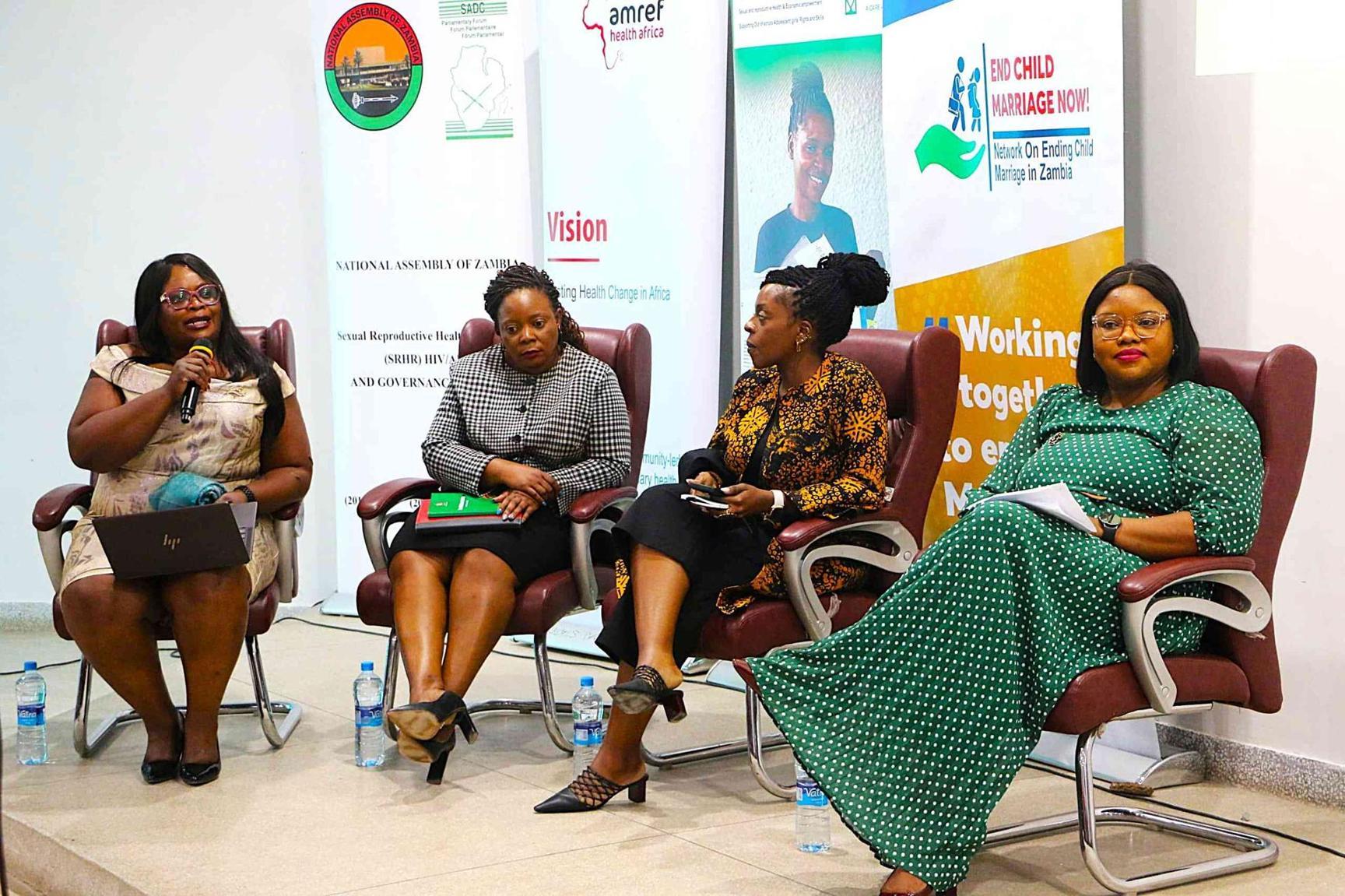By Moses Magadza
Africa-Press – Zimbabwe. A panel discussion following the inaugural public lecture honouring the late Chief Theresa Kachindamoto of Malawi stirred reflection, debate, and renewed urgency for coordinated regional action to eradicate child marriage.
The Southern African Development Community Parliamentary Forum (SADC PF) with funding from Sweden and in collaboration with the National Assembly of Zambia, the University of Zambia’s School of Law, CARE International, and other partners convened the public lecture on Monday last week.
Moderated by gender advocate Ms. Lynn Chinene of CARE Zambia, the panel discussion brought together traditional leaders, legal experts, lawmakers, youth representatives and students as efforts intensified to ensure that the legacy of Chief Kachindamoto translates into concrete, measurable change across the SADC region.
Opening the discussion, Chinene reminded participants that the gathering was beyond academic.
“We gather to reaffirm a collective promise that every girl in Zambia, and across the SADC region, deserves to dream freely, to learn fully, and to live her childhood without compromise,” she said. She urged stakeholders to be bold in dismantling systems that allow child marriage to persist.
Traditional leaders’ role in ending child marriage took centre stage as His Royal Highness Dr Chief Chamuka VI of Zambia shared efforts underway in his chiefdom.
He paid tribute to Chief Kachindamoto, saying, “I had the privilege to meet the late Chief Theresa Kachindamoto and we exchanged notes. I am proud to say that all that she did, I am also doing. I have even gone an extra mile.”
Despite Zambia’s sparsely populated rural settlement patterns, which make monitoring of child marriages difficult, Chief Chamuka detailed a robust system of annulment of child marriages; supporting school re-entry for affected girls; sponsorship of vulnerable learners; marriage registration requiring birth certificates and school letters; strengthened child protection through land rights and poverty alleviation; and active collaboration with MPs on legal reforms.
He said he had “taken back more than 500 girls to school” and expressed disquiet over a legal contradiction that continues to fuel early pregnancies.
“Allowing children to consent to sexual intercourse at 16 presents a big challenge. A child is defined as a person below 18, yet we allow sexual consent at 16. This opens the door to HIV, teenage pregnancy and forced marriage,” he argued.
He called for harmonisation of all laws to reflect the constitutional definition of a child.
Gender and development specialist Ms Mundia Situmbeko of Girls Not Brides delivered an analysis of the root causes and costs of child marriage.
“Child marriage is a gross violation of human rights. It is the robbing of a childhood. If someone is considered too young to drive, vote or sign a contract, why should they be considered ready to marry?” she stated.
She warned that unless gender inequality is tackled at its root, child marriage will persist for generations. She emphasised the need for national reform backed by data and implementation, regional action using tools like the SADC Model Law on Eradicating Child Marriage and Protecting Children Already in Marriage, strong global advocacy to maintain visibility, and civil society-driven community mobilisation.
“Unless we address the root causes of inequality, we’ll still be talking about child marriage a hundred years from now,” she stated.
Legal expert Dr Chipo Mushota Nkhata acknowledged Zambia’s progressive legal frameworks but warned that enforcement and evaluation were lagging behind.
“We do indeed have progressive laws,” she said, referring to the Children’s Code Act and other statutes.
She added, “But we are not monitoring the impact of legislation. Things that worked 10 or 15 years ago may no longer be working today.”
She recommended regular audits of children’s legislation; systematic, community-level data collection; use of Artificial Intelligence (AI) and modern tools to assess impact; increased involvement of universities; and alignment with the SADC Model Law to protect children already in marriage
She also raised a gap in legislation.
“Our Children’s Code Act outlaws child marriage, but is silent on what to do with children already in marriage,” she noted.
Chairperson of the Parliamentary SRHR Caucus, Hon Dr Joseph Musanje of Zambia, reaffirmed lawmakers’ commitment to ending child marriage.
“We are very proud of our work in coming up with the Children’s Code Act,” he said.
He highlighted a pact signed between Parliament and the House of Chiefs to implement the SADC Model Law on Eradicating Child Marriage and Protecting Children Already in Marriage, under which every chiefdom in Zambia will develop local by-laws, register marriages, support education and awareness, and tackle barriers to sexual and reproductive health services.
“We have produced a handbook with key issues MPs are implementing on early pregnancy, child marriage and GBV (gender-based violence),” he added.
Civil society representative Ms. Womba Wanki called for deeper collaboration, stronger implementation, and sustained investment to end child marriage in Zambia. She warned that “nearly one in three Zambian girls is still married before 18” despite major legal reforms.
Wanki – Chairperson of the Network on Ending Child Marriage in Zambia (NECMZ) – said the country’s progress reflects years of persistent advocacy, community mobilisation, and partnership between civil society, traditional leaders and Parliament. But key barriers still remain.
Wanki highlighted that NECMZ, a coalition of 63 civil society and community-based organisations, has long worked to “bridge the gap between law and lived realities,” ensuring girls’ voices shape national decisions.
“We mobilise communities, generate evidence for advocacy, and ensure that girls’ and women’s voices shape the decisions that affect them,” she said.
Through initiatives such as Power to Girls! NECMZ has built one of Zambia’s leading girl-centred advocacy platforms.
“We have girls who sit in the same rooms as Members of Parliament, traditional leaders, religious leaders and parents to discuss the laws that govern their lives,” Wanki noted adding, “The programme gives girls agency that has so often been missing.”
She praised Parliament for integrating civil society recommendations into the Children’s Code Act of 2022 and the Marriage (Amendment) Act of 2023, adding that NECMZ is now focused on ensuring these laws are implemented effectively.
“Our work now is biased towards ensuring that effective implementation occurs,” she said. NECMZ has developed a joint costed implementation plan with the Zambia Parliamentarians Caucus on Children to guide enforcement and budgeting.
Wanki also celebrated traditional leaders such as Chief Chamuka, Chief Chikaza-Munyama and Chief Madzimawe for annulling child marriages, creating by-laws and supporting girls’ return to school.
“These leaders have shown us how good aspects of culture can be a powerful tool when used to uphold the dignity and rights of girls,” she said.
Despite progress, Wanki cautioned that Zambia still faces several structural obstacles.
“We have strong laws on paper, but weak coordination on the ground,” she noted, saying many law enforcement officers and traditional courts still operate under outdated norms.
Wanki argued that real change occurs when girls lead. “Too often, programmes are designed for girls, not with them,” she warned.
She said climate change-induced hunger and displacement were worsening vulnerabilities among girls in districts like Itezhi-Tezhi.
Ms Nelly Njovbu, a young advocate with Plan International Zambia, called for genuine youth inclusion.
“Young people have the authenticity that adults often miss when discussing early and child marriage,” she said adding, “We are the same age as the girls being married off. We are the now generation that is able to rewrite the story.”
She challenged stakeholders to “stop using youth as props and embrace them as partners. There is nothing for young people without young people.”
She urged that youth be involved from policy formulation to implementation and monitoring, not just invited halfway through.
Students from the University of Zambia enriched the debate with lived experiences and sharp insights.
A male student argued, “We need concerted efforts to eradicate poverty, which is fuelling child marriages.”
A female veterinary student called for a return to school-based mentorship.
“When I was in school, female teachers held sessions on early pregnancy and sexually transmitted infections (STIs). Those sessions helped us. The Ministry of Education must revive these interventions,” she submitted.
Another student emphasised the importance of comprehensive sexuality education (CSE).
She said, “Setting an age of consent alone will not stop young people from having sex. We must invest in education to make girls knowledgeable.”
– Moses Magadza is the Media and Communications Manager at the SADC Parliamentary Forum.
Source: NewsDay
For More News And Analysis About Zimbabwe Follow Africa-Press






